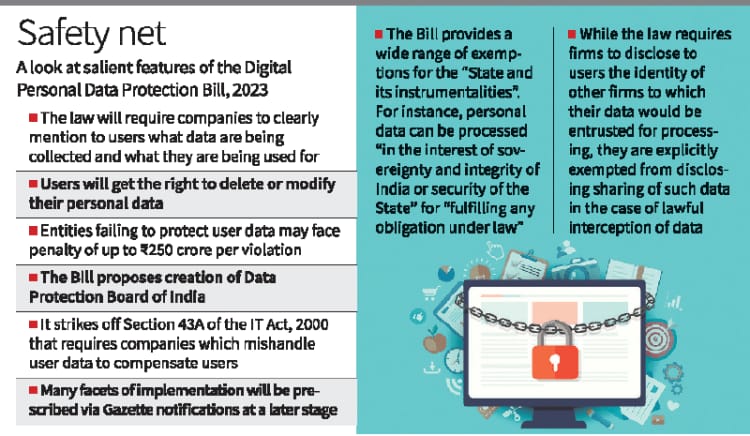The Digital Personal Protection Data Bill was approved in the Rajya Sabha on August 9, after being passed in the Lok Sabha two days prior to that. The Opposition MPs walked out after the session.
Rajya Sabha gave a nod to the new Digital Personal Protection Bill yesterday after the bill was already passed in the Lok Sabha on Monday. While the NDA, BJD (Biju Janata Dal) AND YSR Congress party stood in its favour, the opposition MPs walked out in unanimous discordance after the session in Rajya Sabha.
The bill states the creation of a Data Protection Board of India which will regulate the procession of all data and further mechanism for handling disputes. Ashwini Vaishnaw, the Minister of Electronics and Information Technology informed that these changes would be executed within the next six to ten months or sooner. The members of the Board would be appointed for 2 years and would be eligible for re-appointment as well.
As per the bill, data can only be processed post the consent of the ‘data principal’ (user) on account of ‘legitimate’ uses. Data would be processed within, as well as outside the territory of India via information given in the digital or non-digital format. The data hence received shall be curated carefully and deleted after the purpose has been met.

The bill is facing backlash primarily because of the exemptions set out in it. The Central government is exempted from many rules and regulations sparking furor amongst State governments. The fear of constant surveillance looms over the population especially after frequent and repeated cases of Data leaks. It gives government agencies the power to be exempted from the norms of the bill on particular subject matters like public order, law and prevention of offences.
The Internet Freedom Foundation passed a scathing verbal attack on the bill shortly after it was approved in the lower house. It said that the bill’s aim was not to protect the right to privacy of its citizens, but rather to facilitate the functioning of the regime’s own personal interests by processing data via “State and private actors”. The data does not give certain privacy rights to the data principal including the right to be forgotten and the right to data portability.
Due to the processing and transferring of data beyond the territory of India as well, there is no adequate guarantee of optimum evaluation of personal data protection. Media organisations like Editors Guild and DigiPub have also raised concerns over the trickle down effect of the bill on Press freedom in India. They claim that the bill reduces the scope of right to information and sparks concern over increased surveillance. The censorship of all data would further depreciate Press Freedom in the country, which already stands at an all time low.
On the other hand, private firms have lauded the bill for the ease in strict maintenance requirements placed on firms in the previous drafts. Sanjay Katkar, the Joint Managing Director of Quick Heal Technologies lauded the government’s allegiance to data protection and enforced that heavy penalties should be charged for non-compliance of the rules.
The NDA elaborated its salient features and assured the Lok Sabha and Rajya Sabha of its diligent functioning. Digital Personal Protection Bill 2024 comes after a draft of the Personal Data Protection bill introduced by the NDA government in November 2022. There have been some minor alterations in the new draft.
After getting passed in the Rajya Sabha, the bill is in motion to be implemented.












